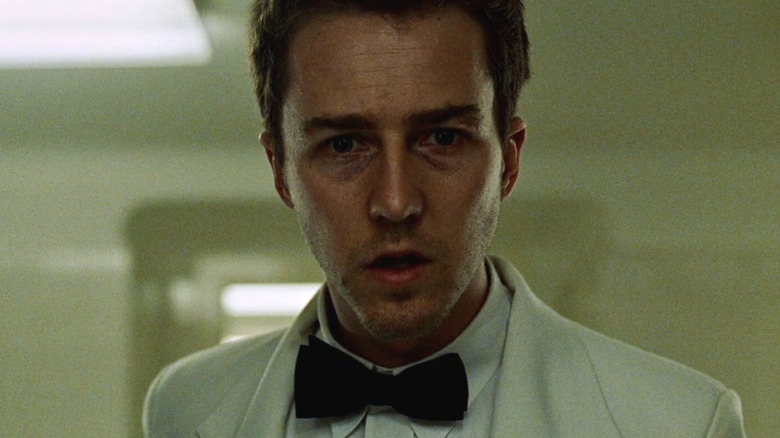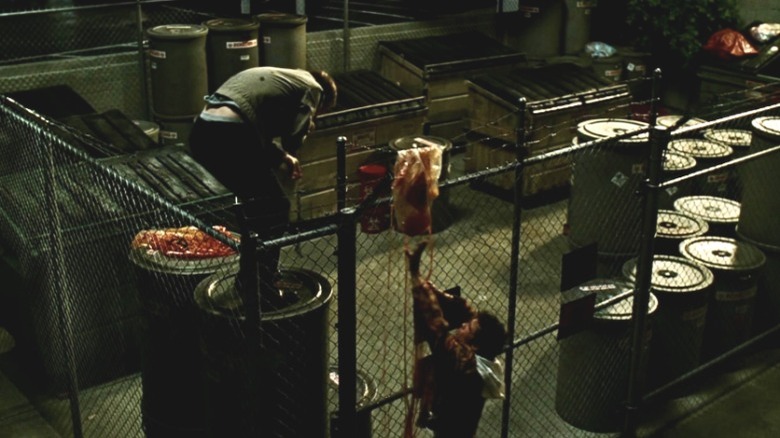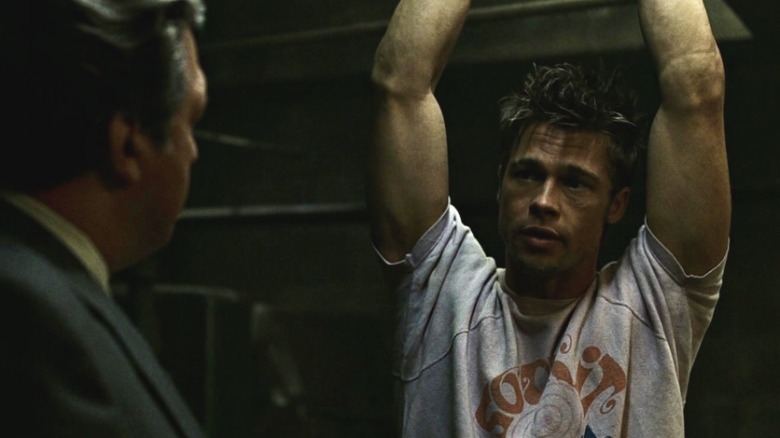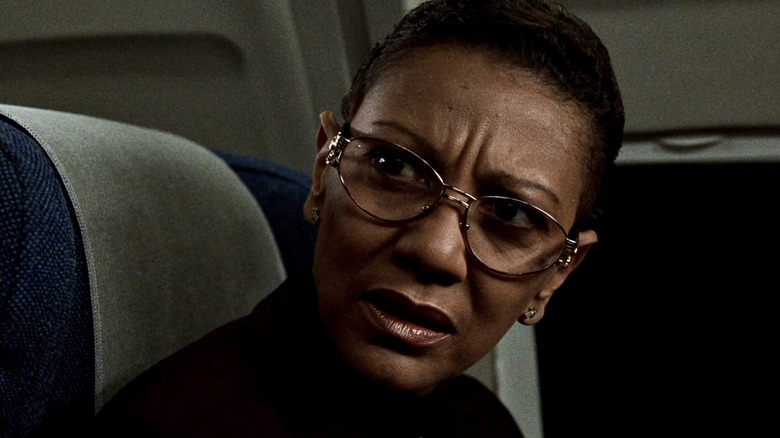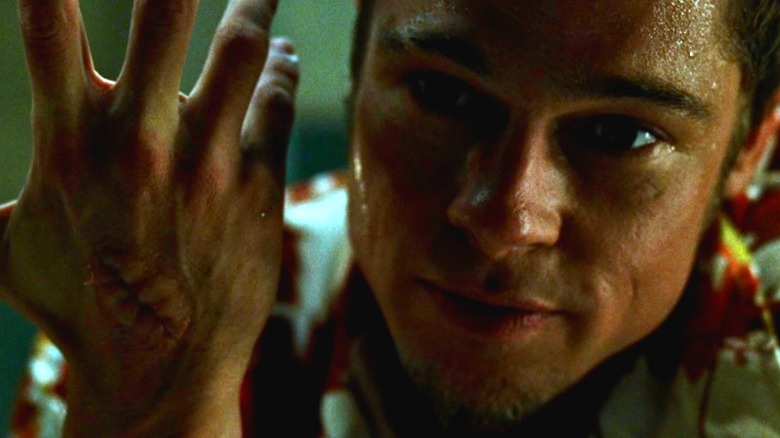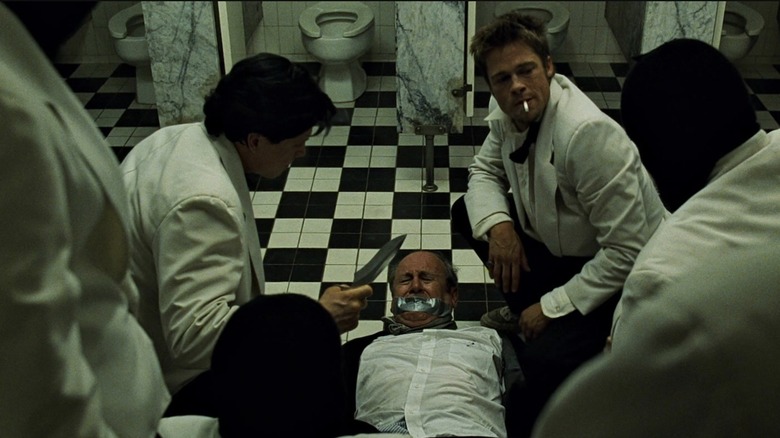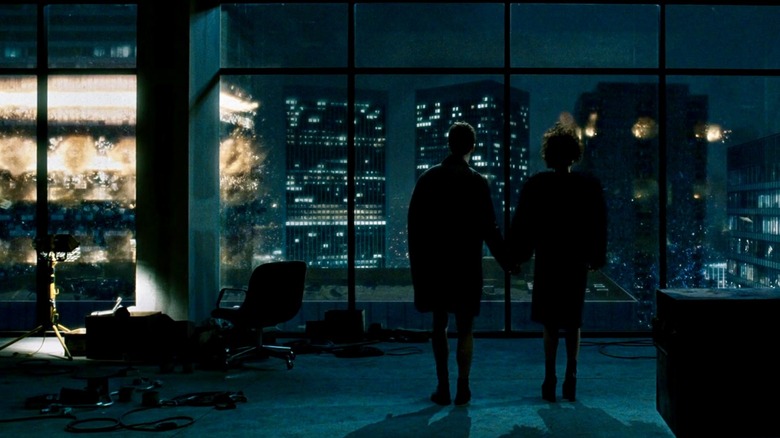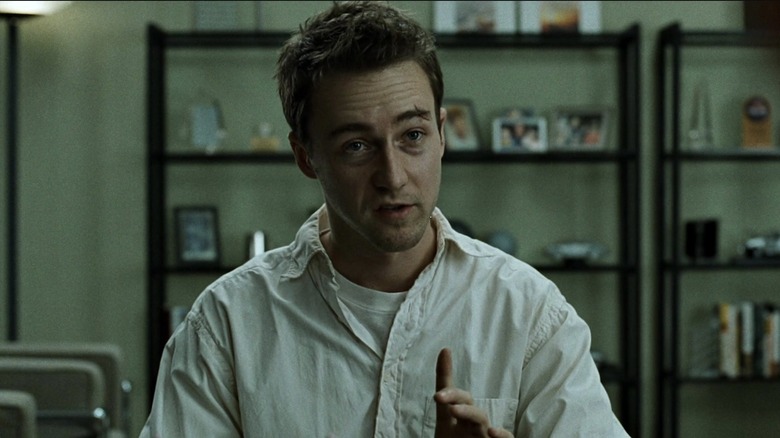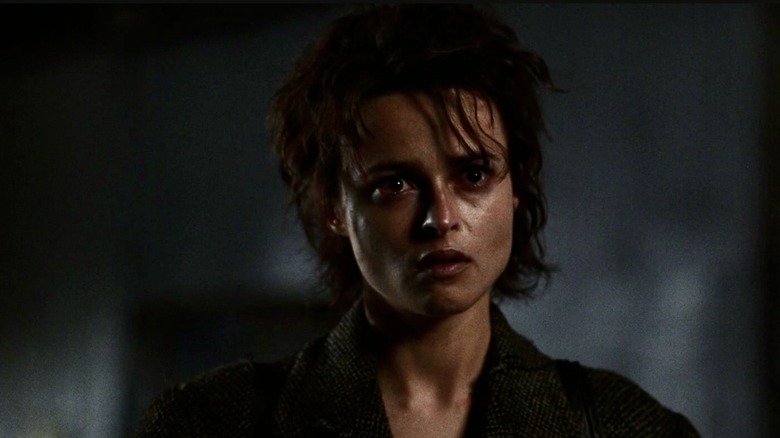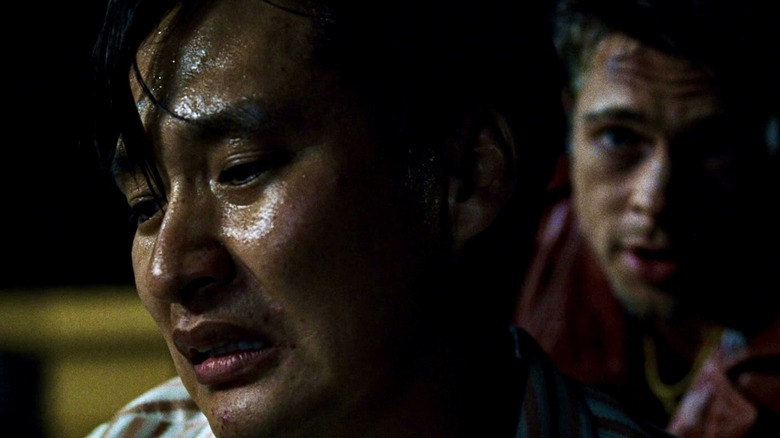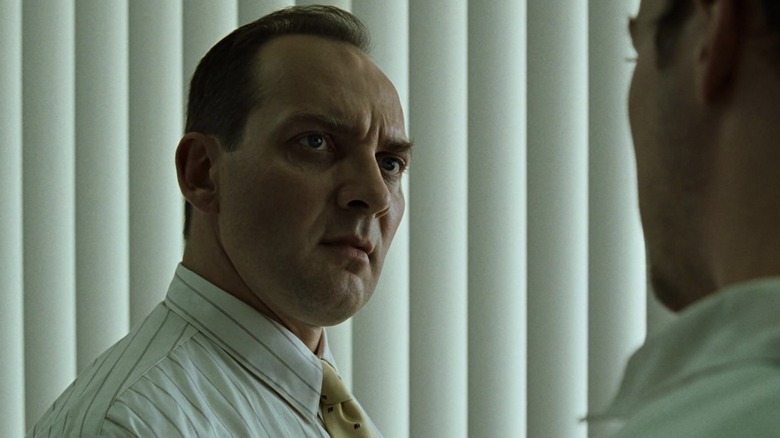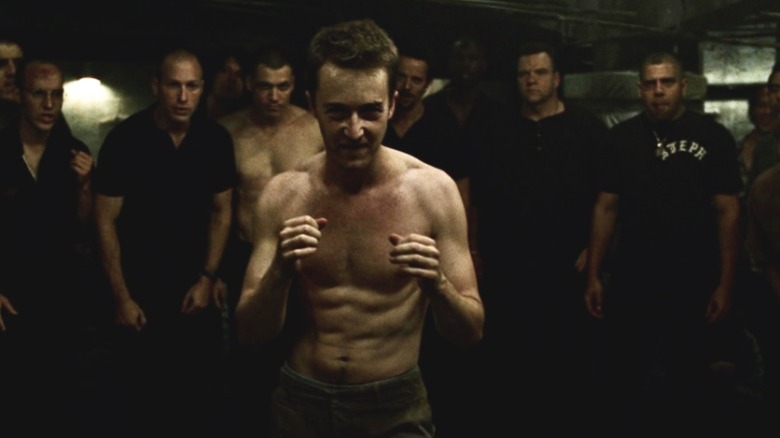12 Most Disturbing Scenes In Fight Club Ranked
In 1999, "Fight Club" polarized critics. Roger Ebert hated the movie. In his two-star review, Ebert called the film "a celebration of violence," but acknowledged the talent of the director and the performances of Edward Norton and Brad Pitt. Many criticized the film for its nonchalant attitude toward violence, but wasn't that the point? Weren't we supposed to be repulsed by the violence and misogyny splashed across the screen? Wasn't the excess intended to disgust us?
Chuck Palahniuk's novel "Fight Club" was a satire; a condemnation of consumer culture and toxic masculinity. According to David Barnett of the BBC, the changes that screenwriter Jim Uhls made gave the film a more ambiguous message. Uhls made Project Mayhem more central to the plot, and depicted Tyler Durden (Pitt) as more seductive, and less obviously narcissistic and sadistic.
Considering the groups who have latched onto "Fight Club," it is natural to question its legacy. Megan Koester with Vice did when she asked, "If most people don't understand the satire, is it still satire?" Unsurprisingly, the most disturbing scenes in the film are violent, misogynistic, and predict an America plagued by homegrown militia groups and domestic terrorism. Keep reading as we rate the 12 most disturbing scenes from "Fight Club."
12. Stealing the fat from the liposuction clinic
The scene in "Fight Club" where Tyler and the Narrator (Norton) steal fat from the liposuction clinic's medical waste is absolutely disgusting. The Narrator throws the bags of fat over the fence to Tyler. Unfortunately, one bag gets caught on the barbed wire at the top of the fence, and the bloody fat oozes out of the bag, pouring down the fence onto Tyler.
This scene is 100% gag-inducing, but is quickly followed by us learning how Tyler renders the fat to make soap, then sells it to expensive department stores for $20 a bar. The Narrator says, "It was beautiful. We were selling rich women their own fat asses back to them," getting a laugh from the audience. There is also something subversive about Tyler's business. His anti-capitalistic stance makes him resent being part of the consumer economy, so he does something clever.
When Tyler steals something rich women pay to have removed from their bodies and transforms it into something else they will pay for, he is both making a statement, and working the system he wants to destroy. We get the sense Tyler enjoys using people's vanity against them, which is basically what advertising does, suggesting Tyler isn't so far removed from the system he wants to destroy. Paper Street Soap Company is a clever enterprise, but it leaves an after-taste of misogyny, which is something "Fight Club" has been accused of.
11. Tyler getting beat up by Lou while laughing
Although it isn't the most graphic fight scene in "Fight Club," watching Tyler beg for and then take a beating from Lou, the owner of the bar where they fight in the basement, is chilling. The way that Tyler manipulates Lou into participating in Fight Club, and then extorts permission to continue the fight, is unsettling.
Tyler elicits anger from Lou by laughing hysterically while getting hit, essentially taunting Lou into hitting him harder. Lou is so disturbed by Tyler coughing up blood that he flees the basement with his associate, giving them permission to continue congregating to fight. The way the members of Fight Club welcome pain is unsettling, but up to this point, we have only seen members taking part in the fights. We haven't seen the reaction of an outsider yet. Seeing Lou's disgust and repulsion reminds us that the club Tyler and the Narrator have created is not normal.
This is the point where the glorification of "Fight Club" starts to break down, and the audience remembers why society shuns violence. The members of Fight Club think they are reclaiming their masculinity through violence, and see it as a liberating force rather than a destructive one. We often link this reclamation of masculinity and an aberrance of emotional sensitivity to alt-right groups who have not only embraced "Fight Club," but have also adopted the slur "snowflake" from this film (via Esquire).
10. The Narrator explains how car manufacturers do recalls
The scene where the Narrator explains how car manufacturers decide to do a recall is chilling. While discussing the accidents he reviews as a recall coordinator, and the mathematical formula his company uses to decide on a recall, the Narrator is completely detached. Both the Narrator and the car manufacturer express little regard for human life. It's the same disregard for life we will see in several moments in "Fight Club" and later in Project Mayhem.
Rather than being appalled by the company's greedy stance — only doing a recall if the projected settlement payouts are more than the cost of a recall — the Narrator talks about the formula like he is sharing good gossip with the woman sitting next to him on the plane. Her reaction to the information he shares is our subtle reminder of what an emotionally healthy reaction to this inflammatory information should be.
This scene suggests the Narrator's work as a recall coordinator has desensitized him to human suffering and death, leaving him with a dark sense of humor, and a deadened heart. The Narrator shares how numb he feels, leading to the emptiness that fuels both his insomnia and his "IKEA nesting instinct." This scene is one of the first indictments of consumer culture, and the greed that fuels capitalism when it highlights the auto company's adherence to the bottom line, rather than the safety of its customers.
9. The chemical burn scene is excruciating
The scene where Tyler gives the Narrator a chemical burn on his hand with lye is so difficult to watch. Imagining the pain is physically uncomfortable, but the way the Narrator gives in and lets Tyler torture him is even more disturbing than the pain. This kind of blind devotion the Narrator exhibits suggests he no longer has free will, and has fully succumbed to Tyler's influence.
This scene gives us insight into Tyler's personal philosophy. He believes surrendering to pain leads to enlightenment. His twisted philosophy glorifies violence, toughness, and pain, thinking of them as more valid life experiences than kindness, sensitivity, and comfort. The author of "Fight Club" told the BBC, "I've always thought Tyler was a tough love-type of [life] coach ... Tyler would be what Joseph Campbell called a 'secondary father' figure, such as a teacher, coach, minister or drill instructor, who challenges a person more than a biological father would dare."
Tyler is seductive. He's smart, funny, confident, charismatic, and cool in an edgy way that screams late '90s. The audience of "Fight Club" is supposed to be seduced by Tyler's subversive ideas, just like the Narrator is — but we are also supposed to realize Tyler isn't a hero, and this is a scene where we see Tyler's sadism. Many critics suggested "Fight Club" glorified violence, but this scene suggests the film was actually an indictment of violence and toxic masculinity.
8. Threatening to castrate the politician
The scene where Project Mayhem threatens to castrate Police Commissioner Jacobs for his public remarks about their activities is disturbing because it shows how organized the group has become. This scene also illustrates the power Project Mayhem could wield because they have eschewed the rules of civility, and have no hesitation in using both intimidation tactics and violence to achieve their nebulous goals.
As reported by Vice, "Fight Club," and the figure of Tyler Durden specifically, have been embraced by men's rights activists and the "manosphere." According to Vice, these are radical online communities concerned with the "emasculation" of men in modern society. They blame the "decline" of our culture on the disintegration of gender roles, and think men now fall into two categories: alpha and beta males. Tyler is obviously an alpha. It isn't surprising these groups have latched onto "Fight Club." Much like Tyler, they disregard feminism, and are hostile toward women.
Tyler believes men have been domesticated. He questions marriage, saying, "We're a generation of men raised by women. I'm wondering if another woman is really the answer we need." Tyler supports men using violence to set themselves free. It isn't surprising castration is a recurring theme. The film starts with the Narrator attending testicular cancer support groups, and finding fellowship with men who fear they have lost their manhood. The irony is that these men's groups who embrace the film don't understand Tyler isn't a folk hero, and "Fight Club" is actually a condemnation of toxic masculinity.
7. The ghost-riding car accident
The disregard for safety exhibited by all the men in the car during the car accident scene is disturbing. When we get on the road, we do so with the assumption that people driving in surrounding cars want to avoid an accident as much as we do. Seeing a group roll the dice, allowing gravity and chance to decide their fate, is truly scary. As Amelia Abraham with Dazed Digital said, "It's deeply nihilistic."
The conflict between Tyler and the Narrator infuses this scene with palpable tension. The Narrator finally asks questions about Project Mayhem, and pushes against Tyler's leadership. This conflict builds up to Tyler revealing he blew up the Narrator's condo, literally destroying his safe and predictable life. As they argue, Tyler tells the Narrator, "Stop trying to control everything and just let go." During your first viewing of "Fight Club," this looks like a power struggle between the founders of Fight Club.
Once we know Tyler and the Narrator are the same person, this tense scene means something else. This is where Tyler pushes for full control, not of Fight Club, or Project Mayhem, but of the Narrator's body and consciousness. Tyler is sick of the Narrator's squeamishness, and doesn't want any interference in the goals of Project Mayhem. This scene and many, including the activities of Project Mayhem, explore the disturbing anomie Tyler encourages, and reveal his pro-pain philosophy when he calls the crash a "near life experience."
6. The skyscrapers dropping from the sky
"Fight Club" came out in 1999. Still, anyone who has watched the film after 9/11 was probably unsettled by the last scene of the film, where Marla and the Narrator watch skyscrapers fall, as explosives demolish the surrounding buildings. This scene will conjure memories of watching the Twin Towers fall. Luckily, the buildings in the film were empty, so they killed no one during Project Mayhem's terrorist attack.
When Chuck Palahniuk published his 1996 novel "Fight Club," the Oklahoma City bombing was fresh in the consciousness of Americans. Our fears of domestic terrorism have only grown since the devastating event the FBI has called "the worst act of homegrown terrorism in the nation's history." The most terrifying element in "Fight Club" is when they come out of the basement and start carrying out homework assignments. What begins as pranks and vandalism grow into a private army led by Tyler Durden, who is hell-bent on destroying capitalism.
What is disturbing about this scene is that it is the culmination of an organized extremist militia group's attack on America. As Vice reported, some extremist groups have embraced the politics and tactics of Tyler Durden. These groups are armed, organized, and feel betrayed by our society's evolution. Eric D. Snider of Complex wrote, "Peeing in soups and blowing up buildings isn't rebellion; it's idiotic and pointless. Tyler Durden's followers are too blinded by their perceived wrongs and grievances to see that."
5. The Narrator beats himself up to extort his boss
The scene where the Narrator beats himself up to blackmail his boss into keeping him on the payroll, despite never coming back to the office, is disturbing. This scene also hints at the actual relationship between Tyler and the Narrator when he says, "For some reason, I thought of my first fight with Tyler" while beating himself senseless. Once we learn Tyler and the Narrator are one person with a split consciousness, we realize this scene is the Narrator's first glimpse of a truth he tries to ignore.
This scene is disturbing because we are understanding how mentally ill the Narrator is. He is unraveling and has now destroyed his last anchor — his job. Some have criticized "Fight Club" for associating mental illness with violence, suggesting it won't lessen the stigma associated with mental illness (via Dazed). This film is an exploration of Freud's id because Tyler acts on the urges the Narrator will not. In Jungian terms, Tyler could be the Narrator's shadow, the aspects of himself the Narrator has rejected to fit into society (via VeryWell Mind).
Some think the Narrator's schizophrenia reflects our fractured society, while others believe he suffers from dissociative identity disorder. Dr. Elizabeth Nelson from Pacifica Graduate Institute believes films are an excellent way for people to learn about psychology. In her course, Images of the Monstrous, she suggests "Fight Club," "Silence of the Lambs," and "A Clockwork Orange" are explorations of antisocial personality disorder (via The New Statesman).
If you or someone you know is struggling with mental health, please contact the Crisis Text Line by texting HOME to 741741, call the National Alliance on Mental Illness helpline at 1-800-950-NAMI (6264), or visit the National Institute of Mental Health website.
4. The Narrator tells Marla, Tyler isn't here
When Marla comes to the Paper Street house, and the Narrator is standing outside angrily drinking because he feels abandoned by Tyler, he tells her, "Tyler isn't here. Tyler went away. Tyler's gone." The stunned and hurt expression on her face before walking away is heartbreaking. Once the Narrator realizes he and Tyler are the same person, he understands how dismally he has treated Marla, and worries for her safety.
Still, the narrator actually blames everything on Marla invading his support groups, making it impossible for him to cry. This scene is an excellent example of how the Narrator and Tyler have treated Marla terribly. The Narrator cared so little for Marla that he left her hanging on the phone to overdose alone. She's spoken about with contempt, like when Tyler calls her, "A predator posing as a house pet." Marla is the main reason "Fight Club" has been accused of being flagrantly misogynistic.
These accusations link the film to the incel movement, another online men's group that embraces "Fight Club" and Tyler Durden. As Peter C. Baker with The New Yorker suggests, the negative attitude about Marla reflects incels' negative feelings toward women, and their frustration with life. They feel entitled to things they can't get. This attitude is explored in Tyler's speech when he says, "We've all been raised on television to believe that one day we'd all be millionaires, and movie gods, and rock stars. But we won't."
If you or someone you know is dealing with domestic abuse, you can call the National Domestic Violence Hotline at 1−800−799−7233. You can also find more information, resources, and support at their website.
3. Tyler threatens a convenience clerk's life to motivate him
This scene is disturbing because Tyler's victim, Raymond K. Hessel, isn't a willing participant in Fight Club. Raymond is terrified, and doesn't know this is a cruel exercise Tyler invented to amuse himself, a game designed to bring Fight Club out of the basement and into the world. Raymond doesn't want to be enlightened by terror and violence. He isn't a narcissistic sociopath like Tyler. He's just a wage worker who probably has PTSD now.
Tyler's "homework assignments" reveal how out of control and dangerous Tyler is, and how dangerous his followers are becoming. This is the moment the Narrator realizes Fight Club is morphing into something dangerous. A small detail most people miss is after Tyler and Project Mayhem have abandoned the house on Paper Street, we see a flash of identification cards of the people Tyler has subjected to his "human sacrifice" assignment while the Narrator was sleeping.
While many argue that "Fight Club" glorifies violence, this scene is one that suggests otherwise. The Narrator who has gone along with Tyler's plans is uncomfortable with the cruelty Tyler exhibits in his twisted attempt to motivate Raymond to go back to school. Eric D. Snider of Complex wrote, "What I didn't fully appreciate at 25 that I do at 40 is that 'Fight Club' doesn't endorse Tyler Durden's nihilism, it mocks it. Tyler is an extremist, taking good ideals too far and losing the moral high ground."
2. The Narrator giving his boss a thinly-veiled threat
We must remember "Fight Club" was released in November 1999, months after the Columbine school shooting. The scene where the Narrator threatens his boss by suggesting the employee who left the rules of Fight Club in the copy machine is unhinged, and might carry out a mass shooting at the office if confronted, is absolutely chilling. Columbine hadn't happened yet when the movie was in production. Still, when the movie came out, many viewers connected the tragedy in Colorado with the glorified violence of "Fight Club" and the school shooting affected how the film was received (via CheatSheet).
Of course, mass shootings weren't exclusive to schools. Audiences in 1999 were familiar with the slang term "going postal" after a rash of shootings carried out by postal workers forced Americans to accept we aren't necessarily safe from violence in places we once thought were safe — places like work, school, or even social gatherings like church or a concert (via Vice).
This scene in "Fight Club" is as disturbing today as it was back in 1999, because mass shootings have become a plague that is uniquely American. This is yet another example of the troubling ways "Fight Club" predicted an increasingly fractured and hostile culture many of us unfortunately recognize as the country we are currently living in. This is also the reason that despite being a flawed condemnation of violence and toxic masculinity, "Fight Club" is still worth talking about.
1. The Narrator beating Angel Face senseless
There are a lot of visceral, bloody, intense fight scenes in "Fight Club," but the scene where the Narrator beats Jared Leto's Angel Face bloody is the most brutal of all. It is easily the most disturbing scene in the film because of the graphic nature of the fight, but also how deformed Angel Face is later in the film. Still, the worst part is how no one intervenes despite the Narrator breaking the third rule of Fight Club: "Third rule of Fight Club, someone yells stop, goes limp, taps out, the fight is over."
It is also upsetting because the Narrator loses himself in the violence, turning something that was once a perverse but consensual fight into a vicious attack prompted by jealousy. The Narrator reveals how all-consuming his rage is when he says, "I felt like destroying something beautiful. I felt like putting a bullet between the eyes of every panda that wouldn't screw to save its species. I wanted to open the dump valves on oil tankers and smother all the French beaches I'd never see."
These statements illustrate the negativity members of Fight Club and Project Mayhem must feel to burn their society to the ground. Their spoiled brat, salt-the-earth attitude suggests they will destroy something they can't have, so no one else can have it either. These statements reflect the greediness Project Mayhem sees in consumer culture, but also reveals this greediness may be intrinsic to human nature, and can't be blamed upon capitalism.
